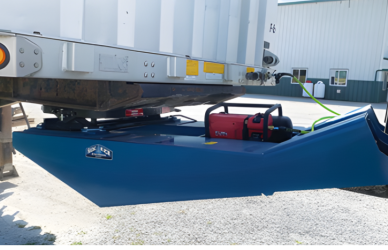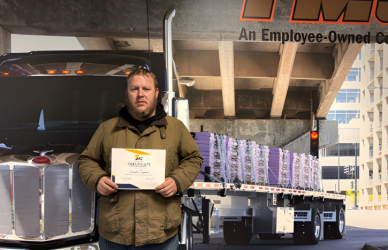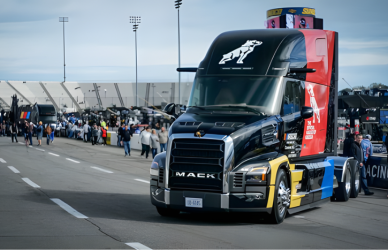Despite petitions from 15,600 truck drivers against it, the FMCSA looks to push forward with a proposal that would enforce speed limiters on most commercial vehicles. The notice of supplemental proposed rulemaking does not specify an exact top speed for these vehicles; however, earlier proposals have suggested anything between 60 mph and 68 mph as potential limits.
With the heavy-duty truck speed limiter debate heating up, it’s important to know where those involved in the industry stand. At a recent FMCSA forum, an agency representative revealed that this June could bring a proposed rulemaking on velocity limiters for big rigs. The organizations involved show mixed opinions about such regulation – some are quite predictable while others may surprise you.
OOIDA
The Owner-Operator Independent Drivers Association is strongly against any mandates to install speed limiters on large trucks.
“Small-business truck drivers strongly object to any speed limiter mandate for several other reasons based on their own experiences,” OOIDA wrote in its formal comments to the agency filed in July. “Speed limiters take control of the truck away from drivers, denying them the ability to avoid accidents and unsafe road/traffic conditions. Speed limiters increase driver stress and make drivers more fatigued because they must operate longer hours in order to complete the work expected of them, and they must also operate at the maximum allowed speed for more of those hours.”
OOIDA has raised the alarm about a potential safety hazard caused by mandated speed limiters for large trucks. With highway speeds as high as 85 mph in some areas, forcing heavy-duty vehicles to travel at 60 mph could lead to cars driving more than 30 mph faster than their truck counterparts on the same roads – a situation that demands careful evaluation of risks.
ATA
The American Trucking Associations has voiced their support for a speed limiter mandate but made clear that the imposed limits should not be set too low.
“We have consistently opposed efforts by anti-truck groups to pursue a speed-limiter rule setting speeds in the low 60s,” ATA wrote on its website.
“Official ATA policy supports a maximum set speed of 70 mph in trucks equipped with automatic emergency braking and adaptive cruise control. In trucks without those safety features, our policy supports a maximum set speed of 65 mph.”
After voicing varying opinions on speed limiters over the years, ATA recently expressed worries about potential differential speeds.
“ATA previously commented on the potential unintended consequences of speed differentials and reiterates that speed differentials between cars and trucks continue to be of considerable concern to motor carriers and drivers today,” the group wrote. “Speed differentials could result in increased aggressive, unsafe behavior by car drivers seeking to overtake slower vehicles and could increase the number of dangerous passing interactions on the highway. Speed differentials have increased significantly over the years as a result of higher posted speed limits in states.”
Teamsters
The International Brotherhood of Teamsters has thrown their support behind the U.S. Department Transportation’s speed limiter mandate, joining several other truck safety groups in signing a letter to Secretary Pete Buttigieg last month. While no formal comments on the matter were posted on Regulations.gov, Teamsters General President, Sean O’Brien’s name showed up on the letter in support of technology mandates such as setting a limit at 60mph.
“Speed limiters, set no higher than 60 mph, must be required by the Department of Transportation on all commercial motor vehicles immediately,” the letter stated.
The letter appears to be in direct opposition to previous Teamster stances on the issue.
Controversy surfaced in 2021 when the Teamsters filed a charge with the National Labor Relations Board against TFI International’s trucking division, TForce Freight. All eyes were on their decision to reduce maximum speed limits from 68 to 65 mph.
“Changing the speed governors directly impacts employee earning capacity, hours of work, hours of service, and safety, which are all mandatory subjects of bargaining,” the complaint reportedly said.
The United Parcels Service, the largest employer of Teamsters Union, has given its full backing to a federal speed limiter mandate; however, there’s unease around having large gaps between different truck speeds. Currently UPS trucks are limited at 68 mph while some that run in higher-speed limit states have an increased cap of 72 mph.
“UPS encourages FMCSA to adopt a speed governor limit for heavy duty trucks of 68 mph and to develop an allowance for higher truck speeds of 72 mph where warranted by local road conditions and higher posted speed limits,” the company wrote in its comments to the agency. “Given our experience in commercial fleet operations, UPS concludes that the speed differential scenario that would arise from limiting trucks at a lower rate of speed would actually have a net negative impact on highway safety.”
In 2009, Teamsters Canada strongly opposed the Ontario government’s move to introduce a speed limiter mandate across all heavy commercial vehicles in the province.
CVSA
The Commercial Vehicle Safety Alliance took no stance on the speed limiter proposal in is 2022 comments.
“CVSA supports regulations and policies that encourage the deployment of safety technologies proven, through independent research, to improve commercial motor vehicle safety, either through preventing crashes or mitigating their severity,” the group wrote. “However, CVSA does not currently have a position in support of or opposition to a federal speed limiter requirement for commercial motor vehicles.”
TCA
The Truckload Carriers Association has expressed their viewpoint on speed limiters, agreeing with the American Trucking Associations that those equipped with adaptive cruise control and automatic emergency braking should have a maximum setting of 70 mph. Those without these safety features are to be capped at 65mph.
Truck Safety Coalition
The Truck Safety Coalition is one of the main proponents of the mandate having guided the letter to Secretary Buttigieg asking for 60mph limiters.
Along with the Advocates for Highway and Auto Safety, the Truck Safety Coalition has met public comments in their belief that a lower top speed will save lives.
“Setting the speed at 60 mph will result in over five times the amount of lives saved and injuries prevented each year compared to 68 mph,” the groups wrote.
Source: Land Line











